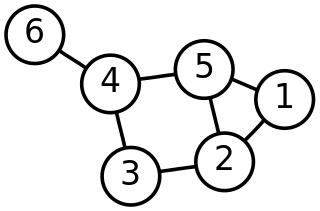Automated theorem proving is a subfield of automated reasoning and mathematical logic dealing with proving mathematical theorems by computer programs. Automated reasoning over mathematical proof was a major impetus for the development of computer science.

Discrete mathematics is the study of mathematical structures that can be considered "discrete" rather than "continuous". Objects studied in discrete mathematics include integers, graphs, and statements in logic. By contrast, discrete mathematics excludes topics in "continuous mathematics" such as real numbers, calculus or Euclidean geometry. Discrete objects can often be enumerated by integers; more formally, discrete mathematics has been characterized as the branch of mathematics dealing with countable sets. However, there is no exact definition of the term "discrete mathematics".
In mathematics and computer science, the Entscheidungsproblem is a challenge posed by David Hilbert and Wilhelm Ackermann in 1928. The problem asks for an algorithm that considers, as input, a statement and answers "Yes" or "No" according to whether the statement is universally valid, i.e., valid in every structure satisfying the axioms.
Mathematical logic is the study of formal logic within mathematics. Major subareas include model theory, proof theory, set theory, and recursion theory. Research in mathematical logic commonly addresses the mathematical properties of formal systems of logic such as their expressive or deductive power. However, it can also include uses of logic to characterize correct mathematical reasoning or to establish foundations of mathematics.

Alfred Tarski was a Polish-American logician and mathematician. A prolific author best known for his work on model theory, metamathematics, and algebraic logic, he also contributed to abstract algebra, topology, geometry, measure theory, mathematical logic, set theory, and analytic philosophy.
In programming language theory, semantics is the rigorous mathematical study of the meaning of programming languages. Semantics assigns computational meaning to valid strings in a programming language syntax.

Samson Abramsky is Professor of Computer Science at University College London. He was previously the Christopher Strachey Professor of Computing at Wolfson College, Oxford, from 2000 to 2021.
In logic, a logical framework provides a means to define a logic as a signature in a higher-order type theory in such a way that provability of a formula in the original logic reduces to a type inhabitation problem in the framework type theory. This approach has been used successfully for (interactive) automated theorem proving. The first logical framework was Automath; however, the name of the idea comes from the more widely known Edinburgh Logical Framework, LF. Several more recent proof tools like Isabelle are based on this idea. Unlike a direct embedding, the logical framework approach allows many logics to be embedded in the same type system.
In logic, a true/false decision problem is decidable if there exists an effective method for deriving the correct answer. Zeroth-order logic is decidable, whereas first-order and higher-order logic are not. Logical systems are decidable if membership in their set of logically valid formulas can be effectively determined. A theory in a fixed logical system is decidable if there is an effective method for determining whether arbitrary formulas are included in the theory. Many important problems are undecidable, that is, it has been proven that no effective method for determining membership can exist for them.
Categorical logic is the branch of mathematics in which tools and concepts from category theory are applied to the study of mathematical logic. It is also notable for its connections to theoretical computer science. In broad terms, categorical logic represents both syntax and semantics by a category, and an interpretation by a functor. The categorical framework provides a rich conceptual background for logical and type-theoretic constructions. The subject has been recognisable in these terms since around 1970.

In computer science and mathematical logic, a proof assistant or interactive theorem prover is a software tool to assist with the development of formal proofs by human-machine collaboration. This involves some sort of interactive proof editor, or other interface, with which a human can guide the search for proofs, the details of which are stored in, and some steps provided by, a computer.
Anil Nerode is an American mathematician, known for his work in mathematical logic and for his many-decades tenure as a professor at Cornell University.
In mathematical logic, algebraic logic is the reasoning obtained by manipulating equations with free variables.
Johannes Aldert "Jan" Bergstra is a Dutch computer scientist. His work has focussed on logic and the theoretical foundations of software engineering, especially on formal methods for system design. He is best known as an expert on algebraic methods for the specification of data and computational processes in general.

Informal logic encompasses the principles of logic and logical thought outside of a formal setting. However, the precise definition of "informal logic" is a matter of some dispute. Ralph H. Johnson and J. Anthony Blair define informal logic as "a branch of logic whose task is to develop non-formal standards, criteria, procedures for the analysis, interpretation, evaluation, criticism and construction of argumentation." This definition reflects what had been implicit in their practice and what others were doing in their informal logic texts.
Norman Linstead Biggs is a leading British mathematician focusing on discrete mathematics and in particular algebraic combinatorics.
Linear Algebra and its Applications is a biweekly peer-reviewed mathematics journal published by Elsevier and covering matrix theory and finite-dimensional linear algebra.
The Association for Logic Programming (ALP) was founded in 1986. Its mission is "to contribute to the development of Logic Programming, relate it to other formal and also to humanistic sciences, and to promote its uses in academia and industry all over the world". It manages the International Conference on Logic Programming, oversees the journal Theory and Practice of Logic Programming (TPLP), and publishes an electronic newsletter.
J. Michael Dunn was Oscar Ewing Professor Emeritus of Philosophy, Professor Emeritus of Informatics and Computer Science, was twice chair of the Philosophy Department, was Executive Associate Dean of the College of Arts and Sciences, and was founding dean of the School of Informatics at Indiana University.




